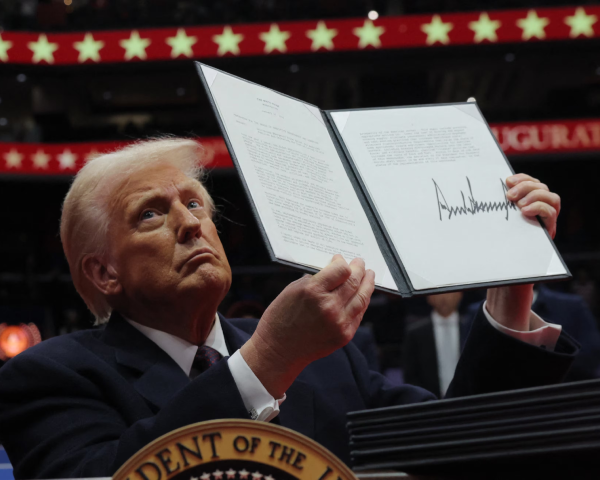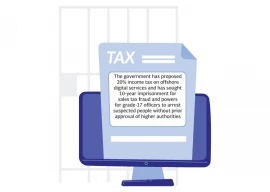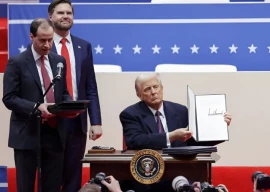
US President Donald Trump marked his first day in office with a series of executive actions aimed at reversing several key policies from his predecessor, Joe Biden.
In a bold start to his second term, Trump issued pardons, overhauled immigration policies, made strides to roll back climate change initiatives, and took significant steps toward reshaping US foreign relations and domestic regulations.
Pardons for January 6th defendants
One of Trump's most high-profile actions was the pardoning of around 1,500 individuals convicted or charged in connection with the January 6, 2021, Capitol attack.
The move was in line with his earlier campaign promises, offering clemency to those who stormed the Capitol during Congress's certification of Biden's 2020 victory.
Trump also announced the end of federal cases against his political opponents, framing his actions as a fight against the “weaponization” of federal law enforcement.
Economic and trade actions
Trump’s economic agenda included a symbolic memorandum to combat consumer inflation, directing federal agencies to reduce regulatory burdens, particularly on oil and natural gas production.
He also signaled plans to impose a 25% tariff on imports from Canada and Mexico, with a potential move on Chinese imports still unclear.
In addition, Trump signed an order delaying the congressional ban on TikTok for 75 days to explore a potential US acquisition that would address national security concerns while keeping the app available to Americans.
Continuing his "America First" agenda, President Trump began his second term by pulling the US out of the World Health Organization, a decision echoing his first term’s emphasis on isolationism.
Additionally, he ordered a sweeping review of US foreign aid spending, aiming to reassess and potentially reduce America’s global financial commitments.
In a series of symbolic moves, Trump announced plans to rename the Gulf of Mexico as the “Gulf of America,” a nod to national pride.
He also ordered the restoration of the name "Mount McKinley" for North America’s highest peak, reversing President Obama’s renaming of the mountain to Denali.
Furthering his nationalistic approach, Trump signed an executive order mandating that US flags be flown at full height every Inauguration Day, a response to the half-staff tribute to former President Jimmy Carter following his death.
Lastly, Trump’s directive for “Beautiful Federal Civic Architecture” signals an ongoing push to promote a distinctive American architectural style in federal buildings.
These actions, consistent with his broader nationalist and isolationist policies, reflect Trump’s continued pursuit of a vision that prioritizes American interests and symbols.
Immigration crackdown
Trump wasted no time in reversing Biden's immigration policies. He reinstated the broad deportation priorities from his first term, declaring a national emergency at the US-Mexico border.
His administration will send troops to support immigration agents, restrict refugee admissions, and reintroduce the controversial “Remain in Mexico” policy for asylum seekers. He also issued an order aimed at ending birthright citizenship, though its legality may face future court challenges.
Climate and energy reversal
Trump began his climate policy overhaul by formally withdrawing the US from the Paris climate agreement, a move he first initiated during his first term but was later reversed by Biden.
He declared an energy emergency and committed to eliminating Biden’s electric vehicle mandate, vowing to push for expanded drilling and fossil fuel production in states like Alaska.
Federal bureaucracy overhaul
Trump announced a hiring freeze for most federal agencies, aside from military and unspecified exceptions, while also imposing a freeze on new federal regulations.
He formally launched the Department of Government Efficiency, a non-official body led by billionaire Elon Musk, which will advise on cutting government spending and programs.
Diversity, equity, and inclusion rollbacks
A major shift in federal policy came with Trump’s rollback of diversity, equity, and inclusion (DEI) programs and protections for transgender individuals.
His administration declared it would recognize only two sexes: male and female, defined by birth biology, rather than gender identity.
The directive also called for the removal of taxpayer funding for "transition services" and mandated the segregation of federal prisons and shelters based on the sex assigned at birth.
Trump's aggressive start to his second term sets the stage for a sharp contrast to Biden’s policies, touching everything from social issues to foreign relations, signaling an even more assertive stance on issues he highlighted during his campaign.
As his administration moves forward, Trump’s actions will undoubtedly spark continued debate and legal challenges, particularly on his more controversial initiatives.




1737501233-0/mlk-(1)1737501233-0-165x106.webp)











1737452260-0/Gaddafi-stadium-(2)1737452260-0-270x192.webp)










COMMENTS
Comments are moderated and generally will be posted if they are on-topic and not abusive.
For more information, please see our Comments FAQ